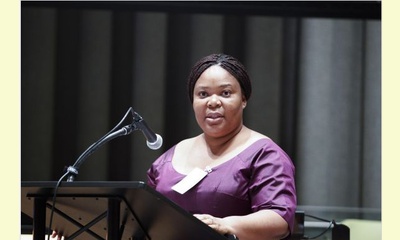|
|
Moving beyond conflict to ‘culture of peace’: Linda Gbowee to the United Nations
un article par Linda Bloom, United Methodist Church (abridged)
During Liberia’s civil war, Christian and Muslim women learned how
to work together to build a “culture of peace” that helped end the
war in 2003. 
Leymah Gbowee of Liberia, 2011 Nobel Peace laureate, gives the keynote address at the U.N.’s High Level Forum on The Culture of Peace on Sept. 9. Photo by Loey Felipe, UN Photo
click on photo to enlarge
Leymah Gbowee, awarded the 2011 Nobel Peace Prize
for leading that nonviolent movement , believes this effort
must be replicated elsewhere.
In a Sept. 9 keynote speech during the United Nations High Level
Forum on The Culture of Peace (See CPNN
August 29, she briefly chronicled what it took to form a
peace-seeking consortium that included women of different
religious and ethnic groups and varying income levels.
Organized in cooperation with The Global Movement for The
Culture of Peace, the forum marked the 15th anniversary of
the adoption of the Declaration and Programme of Action on a Culture of Peace
by the U.N. General Assembly.
The declaration calls upon all governments and all peoples to strive
for a more peaceful world through “a positive, dynamic
participatory process where dialogue is encouraged and conflicts
are solved in a spirit of mutual understanding and cooperation.”
In Liberia, the consortium “spent many days negotiating with each
other to resolve our own conflicts,” said Gbowee, a Lutheran and
author of the memoir, “Mighty Be Our Powers.” But then, she added, they
engaged in strategic planning for hours every day.
That struggle, she said, “inadvertently” followed Article 1 of the
Culture of Peace declaration: “Through education, dialogue and
cooperation, we fostered an environment conducive to peace.”
Peace cannot be negotiated by men with guns, she argued.
“Nothing guarantees that a man’s gun and the size of his arsenal
gives him high intellect to sit at the peace table,” Gbowee declared.
Women, on the other hand, “have proven time and time again that
we can do it right when everyone else misses the mark.”
In his opening remarks to the forum, U.N. Secretary General Ban Ki-
moon noted that achieving peace means more than ending armed
conflict. “Peace is a mode of behavior,” he said, and humanity’s
strongest assets are shared values, not weapons.
“We are many cultures but we are a single family bound by a respect
for human rights and dignity for all,” the secretary general said.
During the event, representatives spoke briefly for delegations from
a number of member states, focusing on the need for tolerance,
equality, respect, understanding, democratic participation,
education and sustainable economic and social development. . . .
Ahmed Alhendawi, the U.N. Secretary General’s Envoy on Youth,
noted that while young people are disproportionately affected by
conflict, they are rarely invited to participate in peace negotiations.
Providing youth with a sense of accountability and ownership in
bringing peace could ensure that having the
world’s largest generation ever of young people “is the
opportunity, not the liability, of our time.”
Oliver Rizzi Carlson, a U.N. representative from the United Network
of Young Peacebuilders, said young people are eager for that
opportunity. “We’re used to talking about peace in terms of results,”
he added. “The trick is (that) peace is about the process. Youth
know this.”
Women, who often work for peace under threatening conditions,
also need to be more prominent in peace talks, said Sanam
Anderlini, co-founder of the International Civil Society Action
Network, echoing Gbowee’s call. . . .
|








|
DISCUSSION
Question(s) liée(s) à cet article:
Do women have a special role to play in the peace movement?,
* * * * *
Commentaire le plus récent:
The 30 articles in CPNN linked to this question make it clear that women indeed have a special role to play in the peace movement. See the following for an historical explanation of why this is true.

|
|









